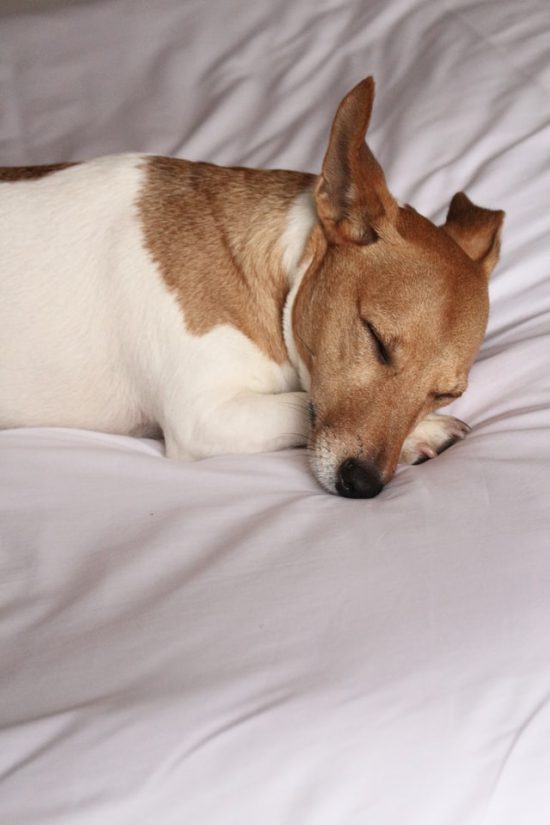Written by Laure-Anne Viselé-Jonkman
On February 10, 2021
Photo credits at the end of this post
OhMyDog stands for evidence-based information about dog training and behaviour. We do our best to keep up to date with significant research. This is how this interesting piece of research made it to my radar.
Reference
Kinsman, R. et al – 2020 – Sleep Duration and Behaviours: A Descriptive Analysis of a Cohort of Dogs up to 12 Months of Age – Animals 2020, 10(7), 1172
Introduction
A few nice did-you-knows came out of their literature review:
- The greater the interaction with people, the less a dog sleeps (with shelter dogs and lab dogs therefore sleeping less than dogs who live in a house).
- Lack of sleep in dogs (and in humans) can make them more sensitive to pain. Inversely, pain can also be the reason for sleep disturbances (we always recommend a visit to your vet if your dog is showing a sudden change in his sleeping pattern).
- A healthy sleep pattern can be used as a positive quality of life indicator (as play behaviour can, for example). Shelter dogs that can cope better with their environment sleep more (up to a certain point, of course. A shut-down dog is most certainly not experiencing a high quality of life).
- Anxious dogs sleep in a position that makes quick escape possible.
- At night, adults sleep between 7.2 and 9.6 hours, on average.
- Dogs between 1.5-4.5 years sleep less than 11-14-year-old dogs, predictably enough.
The authors deplore the lack of studies on sleep patterns in dogs living with humans, hence the significance of this study.

Methods
Dog owners were asked (on an on-line form) about their dog’s sleep behaviour at 16 weeks, and then later at 1 year of age. The same dog was thus compared to itself at two different time points (a longitudinal study).
Their sample size was, for a dog behaviour study, quite respectable: they were able to compare data over 1,000 dogs (and got puppy data for 4000+ puppies).
Results
It is only 1 study, so do take it with a pinch of salt, but… it turned out that puppies (at least, 16 week-old puppies) slept a little more than grown-ups in total and during daytime BUT that they slept less at night than adult dogs (lucky owners!). This is similar to infant human sleep patterns.
-
- Daytime sleep:
- (16 weeks): 3.5 hours
- (12 months): 3 hours
- Sleep at night
- (16 weeks): 7 hours
- (12 months): 7.3 hours
- Sleep (total)
- (16 weeks): 11.2 hours
- (12 months): 10.8 hours
- Daytime sleep:
Dogs were also more likely to fall asleep when people weren’t around, but, when given a choice, they preferred to stay close to their people.
Interesting snippets:
Here are some fun snippets that also came out of their data:
- 73% dogs twitch their legs when sleeping
- 30% (puppies) and 44% (adults) sleep in more than 1 place
- 66% puppies sleep in a crate but 50% adults sleep in a basket
- 5 owners answered that the dogs slept with their heads hanging over from the basket
- Only 8 people said their dog was snoring!
Future studies
- For us puppy instructors, it would be interesting to compare puppies from 7-16 weeks week-by-week. We suspect that this will fluctuate enormously per week of age.
- We are also curious about the effect of lack of sleep on behaviour. Here we can only draw conclusions from our clients’ daily life where we notice puppies becoming little sharks on days when they slept less. It would be good to test and quantify this effect.
Take-home points
What are the take-home points for you, then?
- Just like new parents, don’t count on an uninterrupted night’s sleep at first. Not every puppy can sleep through the night from day 1.
- Puppies don’t sleep that much more than adults, surprisingly. Note that this was measured on 16-week-old puppies. We expect to see big differences with younger puppies.
- During the day, give your puppy the opportunity to settle and recover from stimulating moments.
- Give your puppy a chance to learn to self-soothe.
- Don’t count on your pup’s initiative to signal it is time for a nap. Guide him to a quiet place, thus helping him fall asleep.
Photo credits
Sleeping Jack Russell: Courtesy of Lindsay Davison on Unplash. License: Unsplash terms of use. No modifications made.
